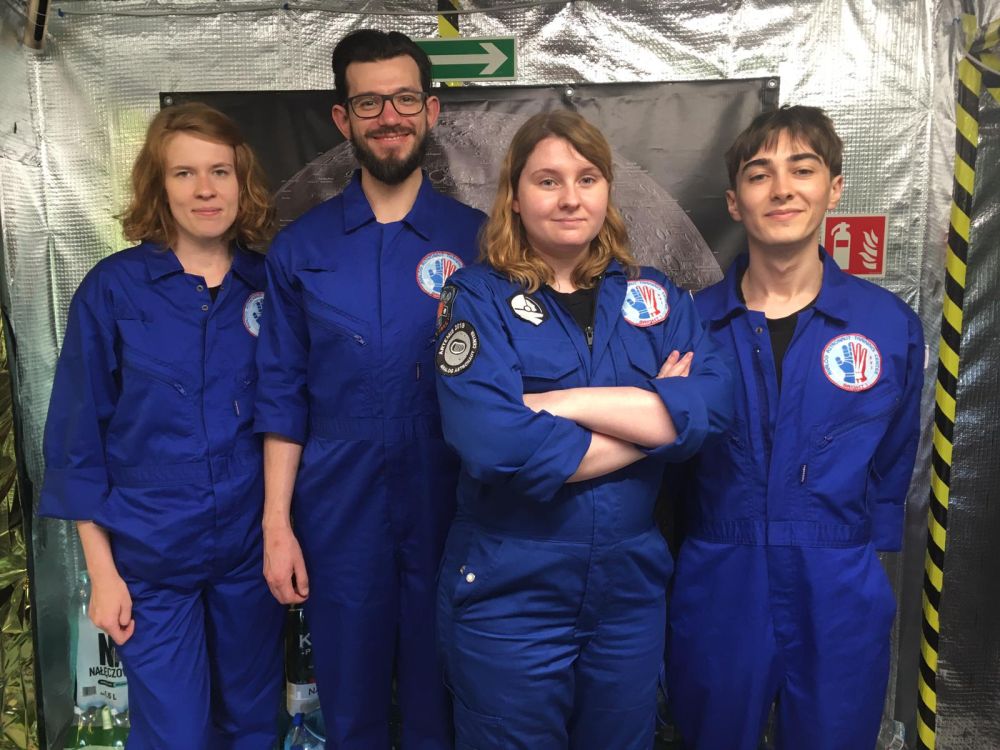YOUR BROWSER IS OUT-OF-DATE.
We have detected that you are using an outdated browser. Our service may not work properly for you. We recommend upgrading or switching to another browser.
Date: 14.07.2020 Category: international cooperation, science/research/innovation
Lesser Poland’s Analog Astronaut Training Center is the location of a mission nicknamed "Bright". Four volunteers will spend six weeks in a habitat with simulated lunar conditions. Among the crew members is our student Justyna Pelc.
 The "Bright 1" mission began on July 1. Four volunteers were locked up in a habitat simulating lunar conditions (the second mission, named "Bright 2” and starting on July 15, aims to simulate Martian conditions). The crew members are Agnieszka Elwertowska from Gdynia, Michał Garus from Chorzów, Arkadiusz Kołodziej from Warsaw, and Justyna Pelc, a student from the Faculty of Computer Science and Management at Wrocław University of Science and Technology, member of the Innspace group.
The "Bright 1" mission began on July 1. Four volunteers were locked up in a habitat simulating lunar conditions (the second mission, named "Bright 2” and starting on July 15, aims to simulate Martian conditions). The crew members are Agnieszka Elwertowska from Gdynia, Michał Garus from Chorzów, Arkadiusz Kołodziej from Warsaw, and Justyna Pelc, a student from the Faculty of Computer Science and Management at Wrocław University of Science and Technology, member of the Innspace group.
Justyna will spend six weeks in the "lunar" habitat, comprising three two-week missions separated by two-week breaks. Like other “analogue astronauts”, our student will be on different diets and will undergo a series of tests.
- Among other things, we’re analysing the way the biological clock works, i.e., circadian rhythms; levels of melatonin, vitamin D, and stress proteins in blood; also levels of stress proteins in saliva - e.g., cortisol, creatinine levels from urine samples; elemental composition of intestinal content based on faecal analysis and so-called metabolites based on faecal samples, i.e., a set of low-molecular-weight chemical compounds – says Justyna.
Just like real astronauts, the participants of “Bright”, apart from performing typical tasks related to measurements of their health, also carry out experiments they are tasked with – for example, they breed cockroaches, grow algae in hydroponic cultures, and do tasks related to rovers.
- Besides, we had to learn many of instructions and procedures related to how the habitat operates – stresses Justyna. - We have a lot of work to do and, despite the isolation, we’re not bored.
Justyna's everyday life can now be followed on her Twitter profile, where she is sharing photos and describing her current activities.
The main coordinator of the "Bright" mission is Agata Kołodziejczyk, PhD, head of Analog Astronaut Training Center. The facility is a private laboratory used to simulate the space environment in scientific experiments focusing on space biology and medicine, owned by the company Astro Tech and Bioastronautics Research. It was created by former specialists of the European Space Agency. For more information about it, visit the AATC website. The "Bright" mission is the longest, most advanced, and most ambitious scientific project carried out so far at Analog Astronaut Training Center.
Our site uses cookies. By continuing to browse the site you agree to our use of cookies in accordance with current browser settings. You can change at any time.